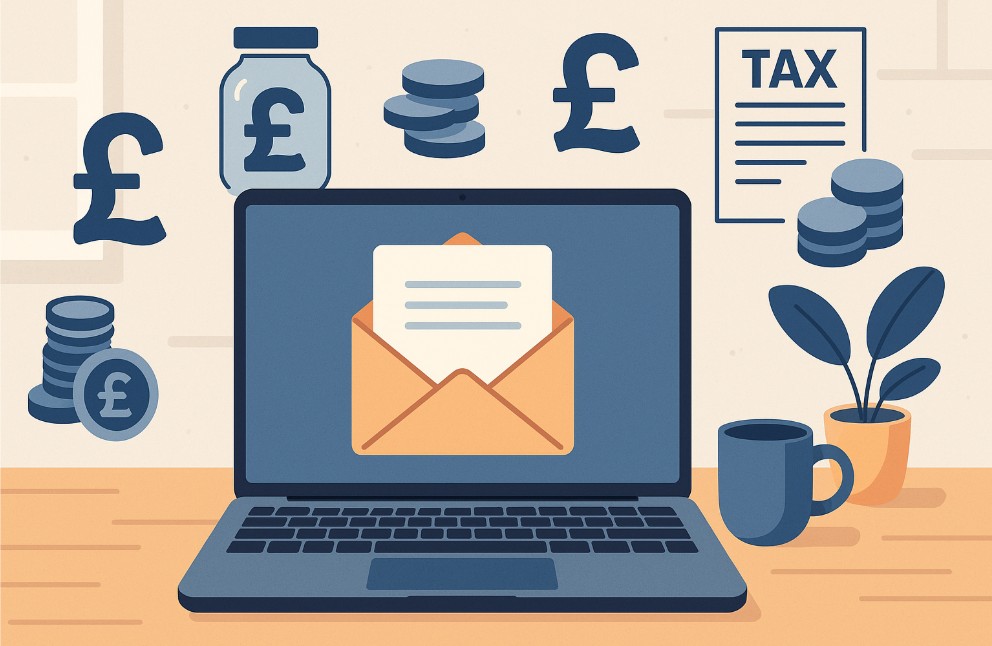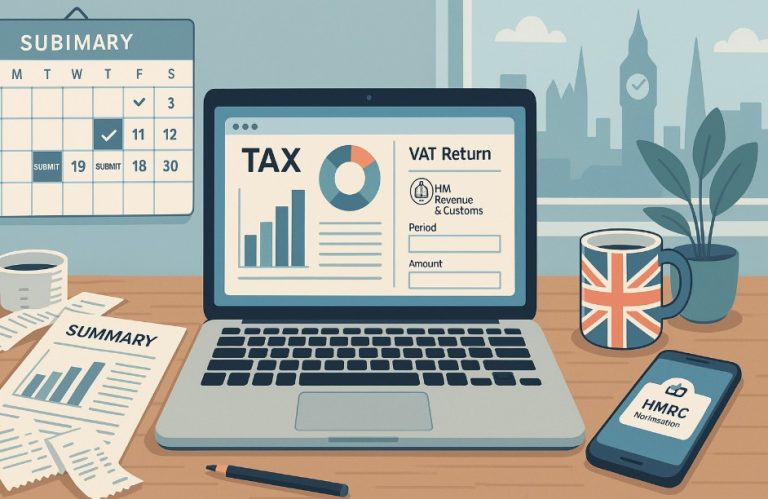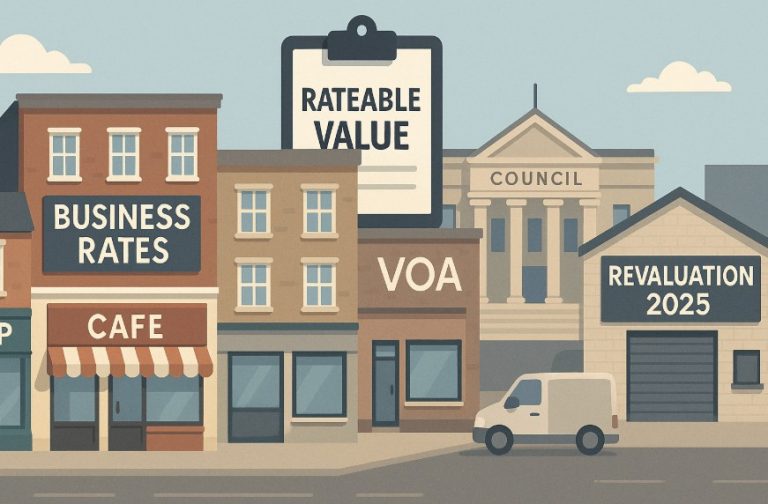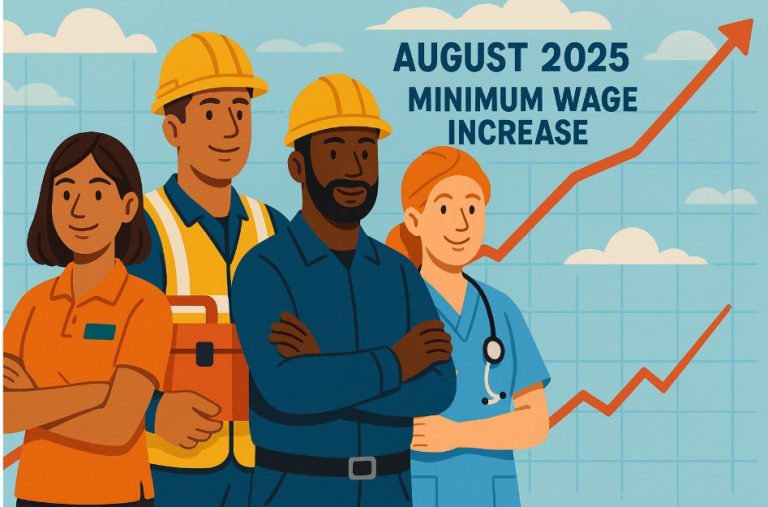HMRC Savings Account Tax Letters – What Is It?
Have you recently received a letter from HMRC about your savings account interest? Are you wondering why you’ve been contacted, especially if your interest earnings seem modest?
These tax letters have left many UK taxpayers puzzled and concerned. The reality is that even small amounts of interest, when aggregated across accounts or combined with changes in your income, can push you into a taxable position.
HMRC His Majesty’s Revenue and Customs is the United Kingdom’s official tax authority. It plays a critical role in managing the country’s financial systems, from collecting income tax, VAT, and corporation tax to distributing benefits and ensuring employers follow national minimum wage rules.
One of its many responsibilities is verifying that individuals are accurately reporting income, including less obvious sources like interest earned from savings accounts.
Savings account tax letters are issued by HMRC when it detects that you may have earned interest above the tax-free limits.
These communications are part of the government’s broader strategy to improve compliance and maintain fairness across the UK’s tax landscape.
Why Might HMRC Contact You About Your Savings Interest?

HMRC uses sophisticated digital systems to collect data directly from UK banks and building societies.
Each year, these institutions are legally required to report the total interest paid to each customer. Once this information is submitted, HMRC matches the data against your personal tax records.
If you’ve earned more in savings interest than your applicable Personal Savings Allowance (PSA) permits, or if your tax status has changed due to a rise in income, HMRC may issue a letter.
Sometimes, these letters are triggered when there is a mismatch between what HMRC expects and what has been declared or not declared by the taxpayer.
It’s also worth noting that the PSA changes depending on your income tax band. So even a small salary increase could reduce your allowance and lead to unexpected tax liabilities.
What Is the Personal Savings Allowance and How Does It Work?
The Personal Savings Allowance lets you earn a certain amount of interest tax-free each year, depending on your income level. This is how it breaks down:
| Taxpayer Type | Personal Savings Allowance |
| Basic Rate (20%) | £1,000 |
| Higher Rate (40%) | £500 |
| Additional Rate (45%) | £0 |
If your interest stays within your PSA, you will not be taxed on it. However, once it exceeds your limit even by a small margin, the excess becomes taxable.
This is where many individuals find themselves caught off guard. For example, someone earning just above the basic rate threshold might see their PSA cut in half from £1,000 to £500, resulting in an unexpected tax liability.
When Does HMRC Send Tax Letters for Savings Accounts?
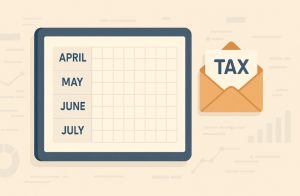
Most tax letters are sent between April and July, after the end of the tax year. HMRC reviews the data it receives from financial institutions and begins flagging any instances where savings interest appears to surpass PSA limits.
Typical triggers include:
- Crossing into a higher income bracket
- Earning interest across multiple accounts
- Failing to declare savings interest via Self Assessment
- Receiving incorrect tax codes that require correction
During the 2024/25 tax year, HMRC reportedly sent thousands of letters to UK residents as early as March.
These communications served as early warnings that they might be liable to pay additional tax on savings interest, especially for those with more than £3,500 in total savings.
Why Did You Receive a Letter If You Only Have an ISA?
One of the most common misconceptions is that savings within an ISA (Individual Savings Account) can never trigger an HMRC tax letter. While ISAs are indeed tax-free under normal conditions, there are a few exceptions that can lead to a letter being sent.
These include situations where your ISA provider incorrectly reports the interest as taxable, you open multiple ISAs in the same tax year (which is not permitted under certain conditions), or your account loses its ISA status due to policy breaches or administrative issues.
In these cases, interest that should have been tax-free might be treated as taxable by HMRC until the matter is clarified. It’s essential to contact your ISA provider and HMRC as soon as you suspect there may be an error.
How Does HMRC Know How Much Interest You’ve Earned?
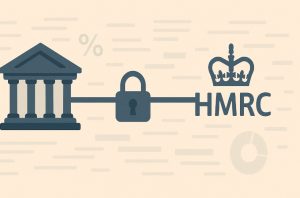
The process by which HMRC gathers this data is automated and integrated with the financial services sector. Every UK bank and building society must send annual reports to HMRC outlining the total interest earned by each of their customers.
This information includes:
- Your name and National Insurance number
- The total interest paid within the tax year
- The type of account (e.g., savings, current, ISA)
HMRC then matches this information with your tax records. If you’re not required to file a Self Assessment, the tax due is often collected automatically through your tax code, meaning you may not realise you’ve paid tax on your savings unless you check.
What Should You Do If You Receive a HMRC Tax Letter?
Receiving a tax letter from HMRC can be unsettling, but it’s not necessarily cause for alarm. The most important step is to review the letter in full.
Look at the amount of interest HMRC believes you’ve earned and cross-check it against your bank and building society statements for the same period.
If the figures appear accurate and the tax due is relatively small, HMRC will typically adjust your tax code to collect the amount over the coming year. In some cases, you may be asked to make a direct payment or complete a Self Assessment return.
If there is any discrepancy or confusion, contact HMRC immediately. They allow a 30-day window for disputing tax figures, during which you can present bank statements, ISA confirmations, or other supporting documents.
Can You Appeal HMRC’s Interest Calculations?
Yes, you absolutely can. If you believe the interest figure is incorrect, the onus is on you to prove it. This involves collecting all relevant statements for the tax year in question and comparing your calculations to those in the letter.
Once you have supporting documentation, contact HMRC either online or by post. Explain the discrepancy clearly and concisely. If they agree, they will amend your record and reissue the appropriate tax code or assessment.
Do You Need to Submit a Self Assessment for Savings Interest?

Not everyone who earns interest from savings needs to submit a Self-Assessment return. However, you must file one if:
- Your untaxed savings interest exceeds £2,500
- You are self-employed or already registered for Self Assessment
- HMRC specifically instructs you to do so in the letter
If your interest is below these thresholds, HMRC will typically adjust your tax code to collect any tax due, removing the need for additional paperwork.
What Happens If You Ignore the HMRC Tax Letter?
Ignoring a tax letter from HMRC can lead to serious financial consequences. HMRC is authorised to charge interest on unpaid taxes, and the current late payment rate is 8.5% per annum.
Additionally, penalties for ignoring or delaying tax payments can add up quickly.
For example:
- £100 fine if you fail to file a required Self Assessment return by the deadline
- £10 per day fine (up to £900) after 3 months of delay
- An additional 5% or £300 (whichever is higher) penalty if you’re 6 or 12 months late
Persistent non-compliance can even trigger further financial scrutiny or audits. That’s why it’s important to respond, even if you believe there has been a mistake.
How Can You Avoid Receiving a Tax Letter from HMRC?
To stay ahead of potential tax liabilities, you need to be proactive in managing your savings and monitoring your interest earnings. Here are a few strategies that can help:
- Use ISAs to shelter interest from tax
- Check your Personal Tax Account online regularly
- Maintain a spreadsheet to track interest earned across all accounts
- Plan withdrawals or deposits strategically to manage annual interest totals
These practices can help you keep your savings within tax-free limits and avoid unexpected letters from HMRC.
What Are the Common Misunderstandings About Savings Tax?
There are many misconceptions around how savings are taxed in the UK, and they often lead to avoidable penalties. Here are a few to be aware of:
- “My savings are too small to be taxed” – Every penny of interest is reported to HMRC.
- “If I didn’t get a letter, I don’t owe tax” – HMRC can adjust your tax code silently.
- “I only have one account, so I’m under the limit” – HMRC looks at total interest across all accounts.
Understanding these realities can help you avoid making assumptions that lead to costly mistakes.
What Should You Do If You Receive a HMRC Savings Warning?
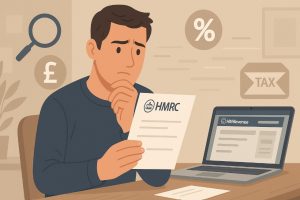
The most important step is to act don’t ignore it. Log in to your HMRC Personal Tax Account and review the figures they have on record.
Compare them with your actual savings account statements, calculate your total interest, and determine whether it exceeds your PSA.
If you do owe tax, follow the instructions in the letter either make a payment or complete a Self Assessment if asked. If something appears wrong, contact HMRC with evidence.
Finally, consider setting up monthly reminders to track your interest earnings going forward, especially if you hold multiple accounts or your financial situation changes during the year.
Frequently Asked Questions
What is the Personal Savings Allowance (PSA)?
It’s the amount of interest you can earn tax-free each year. It ranges from £0 to £1,000, depending on your income tax band.
Why did I get a tax letter if I only have one savings account?
HMRC totals all your interest across all accounts. Even one account can exceed your allowance if the balance or rate is high enough.
Is interest from ISAs ever taxable?
Normally no, but it can be if the ISA loses its tax-free status or is incorrectly reported.
Do I have to file a tax return for savings interest?
Only if your untaxed interest is over £2,500 or HMRC specifically tells you to.
Can I ignore a tax letter if I think it’s a mistake?
No. Always respond and check the figures. Ignoring it could lead to penalties or tax code changes.
How does HMRC get my savings interest data?
UK banks and building societies report it automatically to HMRC every tax year.
Can I appeal HMRC’s interest calculation?
Yes, within 30 days. Provide supporting evidence like bank statements or interest certificates.

